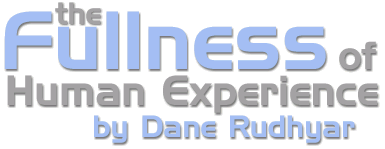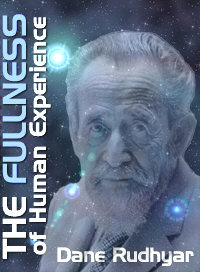 |
| Home | Bio | Art | Music | Literature | Civilization & Culture | Philosophy of Wholeness | Theosophy & Spirituality | Astrology |

CHAPTER SEVEN
A New Frame of Reference: The Earth-being & the Function of Humanity within It - 6 Psyche is the human soul operating in the relatively dark regions where predominantly unconscious and compulsive responses are still rooted in biological impulses and organic feelings. In order to deal with the situations produced by these responses, the discursive intellect devises its formalized interpretations through the uncertain chiarascuro of mental processes. Nous, on the other hand, is the rational Soul which, for many philosophers and theologians, strictly characterizes the human condition and reveals its divine origin. At the noetic level, human consciousness reaches, or at least should be able to reflect, the archetypal forms previously created by the celestial Hierarchies. Nous, when understood in its true nature, is the sphere of principles from which the "higher Self" draws its essential inspiration. The psychosphere is filled with the often discordant results of the activity of human egos. Interpersonal tensions, conflicts, and frustrations generate a variety of products which accumulate in a repressed, but often still very dynamic, subconscious state in the psychosphere. This level of the Earth-being's existence refers, at least to some extent, to what is popularly understood as the "astral world." It is a "personal" realm in the sense that it is filled with the products of interpersonal relationships. Some of these may be very beautiful, perhaps exalting images of love and happiness; yet they are conditioned by the prototypes, the myths and rituals of the culture. Other contents of the psychosphere are the emotional-mental by-products of culture-shock, collective fears, individual failures of nerve, interpersonal conflicts, tragic disappointments, and biopsychic weariness. An acute feeling of futility may oppress an individual-in-the-making as he or she realizes only too clearly — yet still in a "personal" way not entirely free from egocentric desires and/or expectations — the weakness of his or her position in relation to the masses of so slowly evolving human beings. The psychosphere acquires a positive character when it opens itself up to the downflow of archetypal images, and the individualized person accepts the role of self-dedicated agent for the incorporation of the energies of the noetic realm into a consistent series of artistic, scientific, or sociopolitical achievements. But it should be stressed again that what today is so often meant by creativity is most of the time the result of a yearning for self-expression. In most instances, self-expression follows traditional or recently publicized patterns of organization. The self involved in that activity is usually the ego seeking to achieve sociocultural prestige or to release dammed-up psychic energies. In its most negative and dangerous aspect, the psychosphere is also the field of operation of dark Forces, called Asuras by Sri Aurobindo and Mother Mira, "agents of Ahriman" by Rudolph Steiner, and in popular Christianity "devils" or Satanic beings. Most modern psychologists, eager to operate as psychotherapists and thus as "healers of the soul," find it impossible or unwise to concretize subconscious psychic and noetic processes into post-mortem "astral" entities able to affect (and even to control or totally possess) living human beings, and in some instances a whole crowd of fascinated people. This attitude is consistent as long as the psychologist takes the individual person as a frame of reference for whatever occurs in the inner life and mind of human beings acting within an organized society and its culture. Unfortunately such a systematized approach always tends to over-emphasize the ego level of subjectivity and desires. Similarly, the exclusive concern of physicists with the most easily analyzed and seemingly forever divisible foundation of existence, matter, leads to a kind of reductionism according to which every transformative process taking place in biological organisms and every change in the development of a person has a knowable molecular basis. If, on the other hand, the Earth-being is assumed to be the most valid and fruitful frame of reference, a much larger picture emerges which allows an all-inclusive interpretation and an effective grasp of the nature and purpose of the situations with which human beings have continually to deal. In terms of such a planetary picture humanity can discover its dharma — its place of destiny. The discoverer is mind. The discovery is the essential meaning of whatever is, and of the cyclic process structurally defining the relation of this "isness" with all other phases of the Movement of Wholeness. The full development of personhood does not refer only to the possibility of making at least relatively free and autonomous decisions and eventually to act as an individual who is more or less separate from other individuals as well as from the mass of the people in the environment: it implies the capacity to extract a meaning from a series or a group of inner experiences or outer changes. The concept of meaning may be difficult to define; but however defined, it deals with the relatedness of any experience within or in terms of a general frame of reference which mind has established. Human evolution can indeed be understood as the progressive development of the human capacity to give meaning to existence, and thus to everything that happens within the field of our planet accessible to human experience. This is the reason for the remarkable ability of human beings to adapt to extremely varied circumstances and living conditions. Such a power of adaptation had to exist as a potential factor in human nature in order for humanity to fulfill its planetary function within the Earth-being. The actualization of that power requires the progressive development of a series of cultures, because each successive culture provides the persons born and educated in it with a specialized capacity to discover and formulate the meaning of its basic experiences. Moreover, within each culture different groups can be educated or inwardly led to give broader-than-average meanings to individual or collective experiences. Any historical event, such as an action starting a world war, can be given meaning according to the psychological state of a particular person or class of persons, to the mass-consciousness and karma of a nation, or to the planetary evolution of mankind. By permission of Leyla Rudhyar Hill Copyright © 1986 by Leyla Rudhyar Hill All Rights Reserved.  Web design and all data, text and graphics appearing on this site are protected by US and International Copyright and are not to be reproduced, distributed, circulated, offered for sale, or given away, in any form, by any means, electronic or conventional. See Notices for full copyright statement and conditions of use. Web design copyright © 2000-2004 by Michael R. Meyer. All Rights Reserved. |
 |
